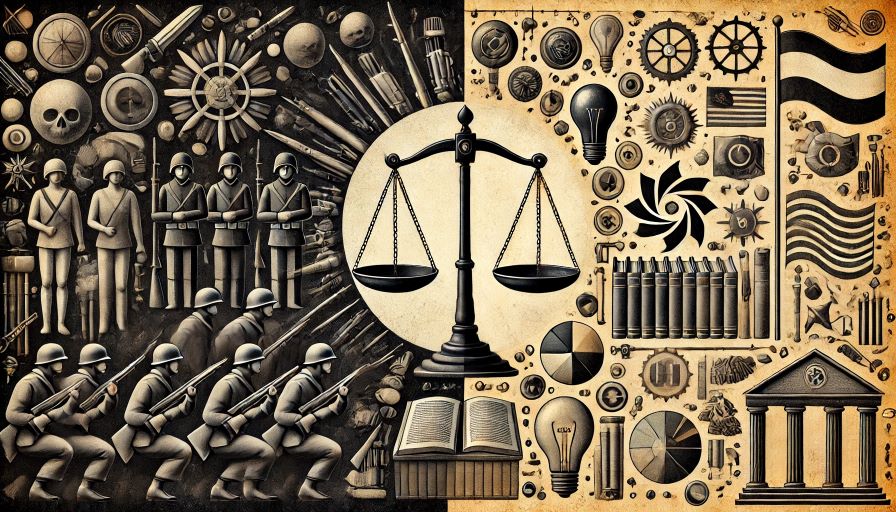
The Emergence and Defining Traits of Fascism
Share
Introduction
Fascism, a far-right political ideology and system of government, gained prominence in the early 20th century, particularly in Italy under Benito Mussolini and later in Nazi Germany under Adolf Hitler. Fascism is characterized by its authoritarian structure, extreme nationalism, and the suppression of political dissent. This ideology emerged in the aftermath of societal upheavals, offering promises of order, national revival, and strong leadership. Throughout this article, we will delve into the characteristics of Fascism, including its reliance on dictatorial power, emphasis on ethnic supremacy, militarism, and state control of the economy.(Pinto 2012)
Historical Context: The First World War and Its Aftermath
The devastation caused by World War I created an environment ripe for the emergence of Fascism in Europe. The aftermath of the war left European societies in a state of disarray, grappling with economic instability, social unrest, and widespread disillusionment. Hyperinflation, soaring unemployment rates, and pervasive poverty plagued many nations, particularly Germany, where the stringent conditions of the Treaty of Versailles further fueled national resentment. In this context, political polarization intensified, with both far-left and far-right ideologies gaining significant traction among the populace.(Boemeke, Feldman, and Gläser 1998) The psychological impact of the war, including trauma and a sense of betrayal, intensified the longing for a powerful, unifying leader capable of restoring national pride.
Fascism capitalized on these post-war realities by offering the promise of order and stability in exchange for authoritarian control. For many, Fascism appeared as a bulwark against the chaos of post-war Europe and the perceived threats of communism and liberal democracy.(Mussolini 1935)
Economic Troubles and the Appeal of Fascism
The Great Depression
During the 1930s, the global economic crisis, often referred to as the Great Depression, significantly intensified social unrest and played a crucial role in the dissemination of Fascist ideology. Widespread unemployment, poverty, and the inability of established political parties to adequately tackle these challenges led to an atmosphere of profound desperation and disenchantment.
In this context, fascist movements confidently portrayed themselves as the solution, offering promises of economic revitalization, job creation, and a restoration of national pride. Their authoritarian, nationalistic, and anti-democratic messages strongly resonated with many who had lost faith in the existing political and economic systems.
Moreover, the Fascists' utilization of scapegoating, attributing the country's problems to minority groups and "outsiders," effectively tapped into the frustrations of the masses. This strategic maneuver empowered Fascist leaders to solidify their control by unifying the population against a common enemy, thereby redirecting attention from the systemic failures that had precipitated the economic crisis.(Finchelstein and Gramsci)
The Collapse of German Democracy
The fall of the Weimar Republic in Germany demonstrates the conditions that enabled Fascism to flourish. The erosion of the ideological foundation of the German democratic republic resulted from years of revolutionary activities by conflicting groups such as Communists, Nationalists, and National Socialists.(Eley 2018) Meanwhile, the victorious allies had refused to modify the harsh terms of the Treaty of Versailles, contributing to a climate of national resentment and the appeal of Fascist ideology.
Amidst the emergence of a fresh wave of nationalism in Europe, which diverged from the amalgamation of cultural nationalism and political liberalism, the Fascists adeptly tapped into the public's clamor for order and a commanding leader.(Lutz 1941).
Characteristics of Fascism
Authoritarian Structure and Dictatorship
Fascism is built on an authoritarian, dictatorial structure, concentrating power in the hands of a single leader or a small ruling elite. This absolute control leads to the suppression of political opposition, curtailment of civil liberties, and the use of state-sponsored violence, defining the governance of Fascist regimes.(Eley 2018).
Extreme Nationalism and Ethnic Supremacy
Fascism unabashedly embodies extreme nationalism, often deeply rooted in the belief of ethnic or racial superiority. Fascist movements consistently champion a vision of a robust, unified nation, where the state and its people stand united under the banner of a shared cultural and ethnic identity. This nationalist ideology invariably leads to the persecution and oppression of minority groups, which are unjustly scapegoated as the source of the nation's problems.(Brown 1998)
Militarism and Expansionism
Fascist regimes typically prioritize a militaristic outlook, confidently emphasizing the importance of a well-equipped military. They firmly believe that war and military conquest are vital for achieving national greatness, expanding their sphere of influence, and securing access to resources and territory.(Acemoğlu, Ticchi, and Vindigni 2010)
State Control of the Economy
Fascist governments commonly exercise substantial control over the economy, resulting in a merging of the state and private enterprise. While not universally state-owned, businesses within Fascist systems are mandated to align their interests with the objectives of the state, typically through a combination of coercion and incentivization.(Cinquini 2007)
Vulnerabilities of Democracy
The rise of fascism serves as a reminder of the vulnerabilities that democracies can face, particularly during periods of economic hardship and political instability. It underscores the importance of strengthening democratic institutions, embracing diverse political perspectives, and fostering social unity. By understanding the historical factors that contributed to the rise of fascism, we can work towards defending civil liberties, promoting inclusivity, and safeguarding democratic principles against extremist ideologies. This awareness helps us learn from the past and build a more resilient and inclusive democratic society.
Knowledge will forever govern Ignorance: And a people who mean to be their own Governors, must arm themselves with the power which knowledge gives.
– James Madison
References
Pinto, António Costa . 2012. "THE NATURE OF FASCISM REVISITED" Columbia University Press, New York. http://www.antoniocostapinto.eu/docs/books/chapters/natureoffascismv6_1_526816.pdf.
Acemoğlu, Daron, Davide Ticchi, and Andrea Vindigni. 2010. "A Theory of Military Dictatorships" American Economic Association 2 (1) : 1-42. https://doi.org/10.1257/mac.2.1.1.
Boemeke, F., Manfred, Gerald D. Feldman, and Elisabeth Gläser. 1998. "The Treaty of Versailles" Cambridge University Press. https://doi.org/10.1017/cbo9781139052450.
Brown, David. 1998. "Why is the Nation-State so Vulnerable to Ethnic Nationalism?" Wiley 4 (1) : 1-15. https://doi.org/10.1111/j.1354-5078.1998.00001.x.
Cinquini, Lino. 2007. "Fascist Corporative Economy and Accounting in Italy during the Thirties: Exploring the Relations between a Totalitarian Ideology and Business Studies" Routledge 17 (2) : 209-240. https://doi.org/10.1080/09585200701376550.
Eley, Geoff. 2018. "How Do We Explain the Rise of Nazism? Theory and Historiography" : 15-32. https://doi.org/10.1002/9781118936894.ch1.
Finchelstein, Federico, and Antonio Gramsci. "On Fascist Ideology"
Lutz, Haswell, Ralph. 1941. "The Collapse of German Democracy under the Brüning Government March 30, 1930-May 30, 1932" University of California Press 10 (1) : 1-14. https://doi.org/10.2307/3633179.
Mussolini, Benito. 1935. "The Doctrine of Fascism"
